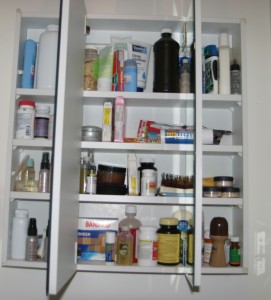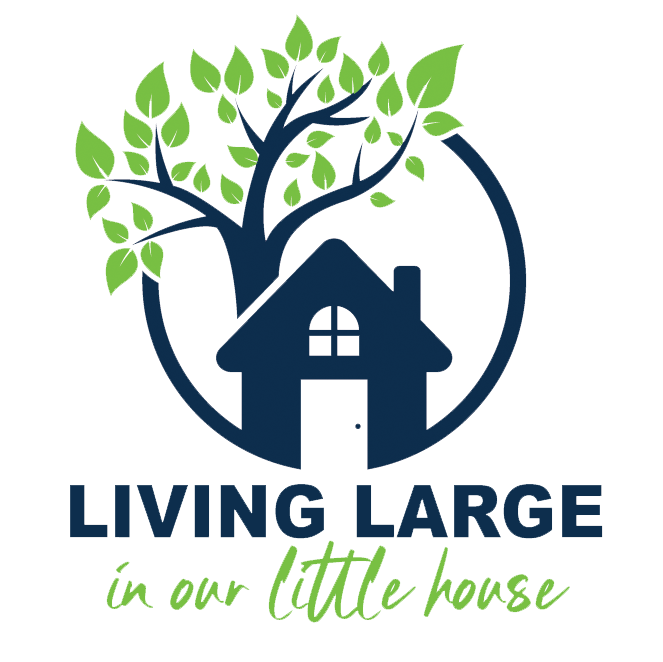Clearing out the Medicine Cabinet
I really miss the energy I had well into my 30s. I could drive that Baby Blazer that 40 minute commute to my corporate hell, come home and still have the energy to clean out an entire closet, hang some wallpaper border or even paint an entire bedroom.
Good thing I have such a small home now, as those tasks are always relegated to the weekends (the longer the weekend, the better), or staycations.
This weekend, they’re predicting rain, so it will be a good time to clean out the medicine cabinet and bathroom vanity, as part of my spring cleaning ritual.
When I clean out the medicine cabinet, I usually do have some outdated medicines that I need to dispose.
I’ve never flushed these down the toilet and I’m glad after reading this article last summer, blaming flushed pharmaceuticals for doping up fish, and even killing them, in our rivers and streams.
However, it just never felt right to simply throw them into the trash either. Yesterday, I started researching how medicines should be disposed of. The EPA doesn’t have any recommendations, but some environmentalists did:
- Crush the pills and mix them in with something such as coffee grounds, which will deter any animals from eating the powder.
- You can also leave them in a securely closed container. However, remember that glass will break and plastic will crush in the landfill. Wild animals do forage through trash.
Thanks to our quest to have more natural remedies in our cabinet, this should not be as big of a problem for us next year.
How do you dispose of outdated medication in your cabinets?









I like the idea of giving them back to pharmacies. It’s like being able to recycle used motor oil at the auto shop. Make a lot of sense to me … as long as those collecting the meds dispose of them safely.
One of our agility dog friend got very, very sick from eating some antidepressants. They never did find out how she got them (maybe a neighbor’s trash), but it was scary for a while with her health.
That’s awful about the dog, Roxanne. It’s so very important to be careful with those meds!
I have heard that there are some programs around the country that will take back unused meds, examine them and reuse them in special programs. I don’t know how to find this though! I agree that meds in the trash is a huge problem!
There should be programs like this. I did find a program that took my mother’s meds. Since she was on various heart meds, blood thinners and meds for COPD, there was a doctor who treats poor elderly patients willing to take them. It’s a crime and so wasteful not to be able to recycle these meds to the poor.
I will add, FYI for anyone with pets – while there aren’t many programs that allow doctors to (legally) take back meds of deceased human patients, many vets will take unused meds of deceased pets and recycle them to people who cannot afford them. When we lost our Hershey, we gave back several prescriptions and other items such as IV’s related to her kidney failure, which were forwarded to our state’s vet school, where many people take their pets for treatment. I received a nice note assuring me our donation had helped several owners with that expense.
I live in Australia and we can return drugs to the pharmacy as well. In fact they positively encourage it – my pharmacist has a locked box next to his desk that you can just drop them into. I am surprised the US doesn’t do the same thing considering how many problems these things cause.
The U.S. is so wasteful and not mindful of the consequences to our environment. Doesn’t surprise me at all. Thanks for the comment, Esther. Great having you from Down Under!
Great post with great advice…and ditto on lucky canadians who can just return them to pharmacy…I will ask aboutthat next time I head to my local pharm.
That’s a really good idea, Babette.
Hey Kerri,
I have always flushed mine down the toilet, but have always been on a septic tank, with this last move were now on a sewer system. Can flushing them in a septic tank have any effects on any wildlife?
I never thought of disposing them this way would have an effect on wildife. Thanks for the heads up!
Septic tanks “leech” into the ground, which can affect ground water and springs. So, yes, I believe it can. We have to be very careful here as we are also on a well, so anything that seeps into the ground can end up in our spring that feeds the well. Welcome, and thanks for visiting Living Large!
Wow Kerri, thanks for bringing that to our attention. I guess a lot of us never thought about the whole flushing thing or putting them down the drain. I remember when my father passed away, we were instructed to wait for Hospice to dispose of his meds. When they arrived they just counted them and then put them down the sink! I like the coffee ground idea. That would be a really simple way for most of us. Thanks again for the insight!
That’s horrible, Pam, and I just received an email telling me a similar story about Hospice flushing unused meds.
Here in Canada we can just return them to the pharmacy for safe disposal.
Wow, Olivia. Another good reason to be Canadian. 🙂
Look forward to reading about your findings for your state on your blog, Alexandra!
This is a big concern of mine, since pharmaceuticals have been found in the water on Cape Cod by Silent Spring Institute. Some towns have the health agent agree to collect old meds. Others have the Fire Department responsible. It is a shame no one collects them for donation to third-world-countries in need. I remember such a program when I lived in France. I think each state should have a policy. I will try to find out whether MA has one. Thanks for bringing attention to this issue in your blog!